| |
31 October 2020 |
|
Sir Sean Connery
1930-2020
|
|
|
Part 7: First Knight
In 1975 Sean Connery's friend Richard Harris (1930-2002) had played Richard The Lionheart in Robin and Marian, and in a curious twist of fate,
Connery also played the role in an uncredited cameo appearance at the end
of Robin Hood: Prince of Thieves (1991), with Kevin Costner in
the title role. Although Robin Hood: Prince of Thieves got mostly
negative reviews it was huge international hit.
Sean Connery reprised his role of Juan Sánchez Villa-Lobos Ramírez in
Highlander II: The Quickening (1991), which once more opened to
terrible reviews, and failed to live up to the cult status of its
predecessor. Undaunted, Connery reunited with director John McTiernan (The
Hunt For Red October) to star in the 1991 drama The Medicine Man.
Once more, the film was poorly received and just broke even at the
box-office. |
|
 |
|
In 1992 Sean Connery
starred as Capt. John Connor in the crime-drama Rising Sun directed
by Philip Kaufman. The film, in which Connery also served as executive
producer, co-starred Wesley Snipes and Harvey Keitel. Despite the
controversy surrounding the negative depiction of Asian-Americans,
Rising Sun (based on a novel by Michael Crichton) was a hit upon its
release. The following year Sean Connery took on the supporting role of
Dr. Alex Murray in Bruce Beresford's A Good Man In Africa (1994).
With a screenplay by future James Bond continuation author William Boyd
(SOLO), A Good Man In Africa was another box-office disaster.
Connery's career had once again gone into decline and he was now only making
one film each year. In 1995 Sean Connery turned down the role of King
Edward in the film Braveheart directed by Mel Gibson, in order to
star in Just Cause, for his friend American Art dealer turned film
producer/director Arne Glimcher. The resulting film saw Connery acting
once more as executive producer and starring opposite Laurence Fishburne.
Just Cause was another film that was only a moderate hit at the
box-office, released to mostly negative reviews in 1995. |
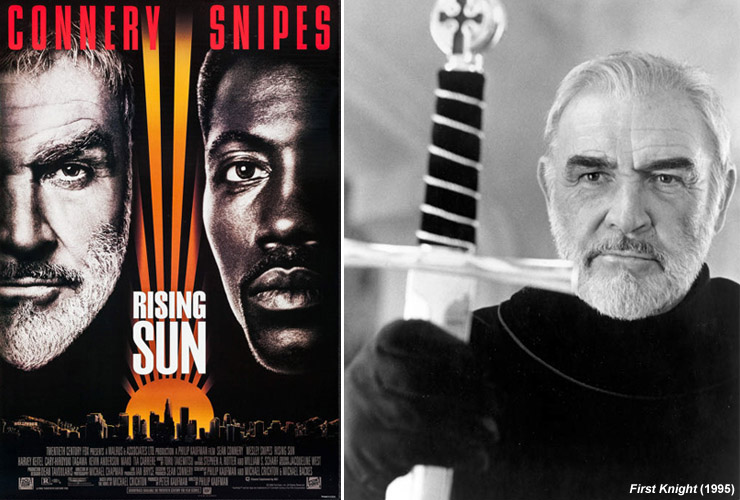 |
|
Harking back to his trio
of historical successes in the mid-1970s, Sean Connery next starred as
King Arthur in First Knight which also featured Richard Gere as
Lancelot. The film was at last a huge hit, although not particularly
well-received by critics. First Knight was originally to have been directed by
Terence Young who would have reunited with Connery 30 years after
directing
Thunderball, but Young sadly died during pre-production. Sean Connery
attended a memorial service held for Terence Young on November 10, 1994
where he was visibly affected by the loss of his friend and mentor, the
one man above all others responsible for the transformation of the young
actor into the character of James Bond. First Knight reunited
Sean Connery with Sir John Gielgud with whom he had appeared in Murder
On The Orient Express (1974). Although top-billed in First Knight,
Connery does not appear for the first 30-minutes, and his role could really be
considered that of supporting actor, but it is a testament to his stature
at this stage in his career, that he could still attract star-billing and
be the marquee name for such a high-profile film. |
|
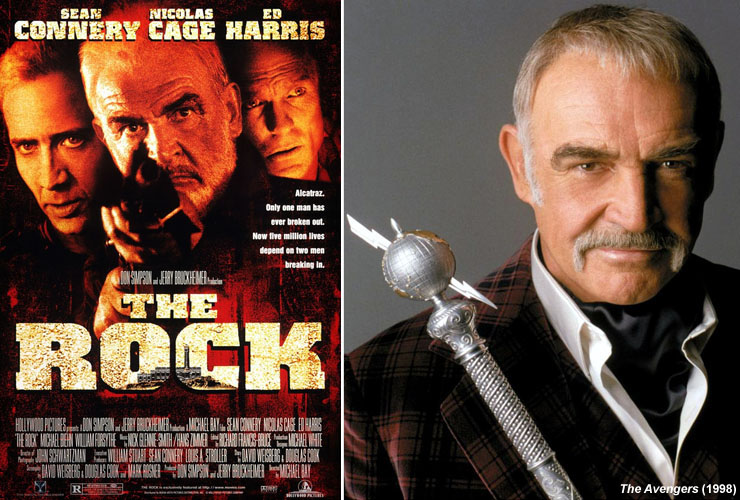 |
|
In 1996 Sean Connery
provided the distinctive voice of ‘Draco - The last Dragon’ in
DragonHeart in the British/American fantasy action-adventure film
directed by Rob Cohen. Connery then took on the starring role in The
Rock (1996), as Captain John Patrick Mason in the action-thriller
directed by Michael Bay. At the age of 66 Connery still proved he was a
believable action-hero, and the film was a massive hit at the box-office
despite some less than kind reviews. Co-starring Nicholas Cage and Ed
Harris, The Rock was photographed by cinematographer John
Schwartzman, son of the producer who had given Connery so many problems on
Never Say Never Again (1983). Sean Connery then appeared as the
villain Sir August de Wynter, in the big-screen adaptation of the popular
British TV-series The Avengers. Co-starring future M Ralph
Fiennes as John Steed and Uma Thurman as Emma Peel, The Avengers
(1998) was a box-office disaster and following test screenings was reduced
from 115-minutes, to a running time of just 89-minutes. With some of the
worst reviews in cinema history, The Avengers ultimately only
recouped $12-million less than its $60-million budget. Several UK critics
noted that as an American production, the film fatally misunderstood the
symbols of “Britishness” central to the success of The Avengers
TV-series; regardless of the fact that with the exception of Uma Thurman,
the cast of supporting players (including Patrick Macnee as the voice of
‘Invisible Jones’) were all British. Rumours abound of a so-called
‘Directors cut’ of The Avengers, restoring the lost footage, but
this has yet to materialise - as it stands the film is best forgotten.
Sean Connery was also part of the ensemble comedy-drama Playing By
Heart (1998), in which he played the role of TV Producer Paul
opposite Gena Rowlands as his wife. Despite Connery taking a very small
salary in order to appear in the film, Playing By Heart still lost
money at the box-office and is only distinguished by having a score by
eleven-time James Bond composer John Barry, much of which went unused in the film, but thankfully appeared
on the soundtrack CD. |
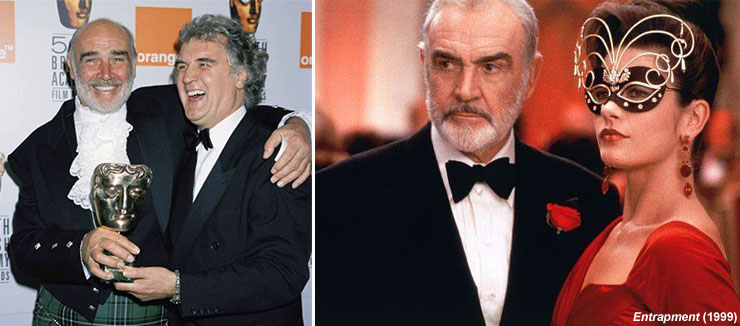 |
|
Sean Connery was honoured
with the BAFTA Fellowship at the 51st British Academy Film Awards in 1998.
Awarded in recognition of “outstanding achievement in the art form of the
moving image”, the award was presented by friend and fellow Scot Billy
Connolly. Sean Connery was visibly moved when giving his acceptance
speech. In his final film of the decade Sean Connery took on the starring
role in Entrapment (1999), an American heist-thriller co-starring
Catherine Zeta-Jones and directed by Jon Amiel. Entrapment proved
to be a huge commercial success for the star, who also co-produced the
film. Connery also produced Finding Forrester (2000) in which he
played the role of an American writer who befriends a young black teenager
(Rob Brown). Connery claims to have based the character of William
Forrester on that of reclusive American author J.D. Salinger (1919-2010),
most famous for writing The Catcher in the Rye (1951). Finding
Forrester was a critical and commercial success and would turn out
to be Sean Connery's penultimate on-screen performance. |
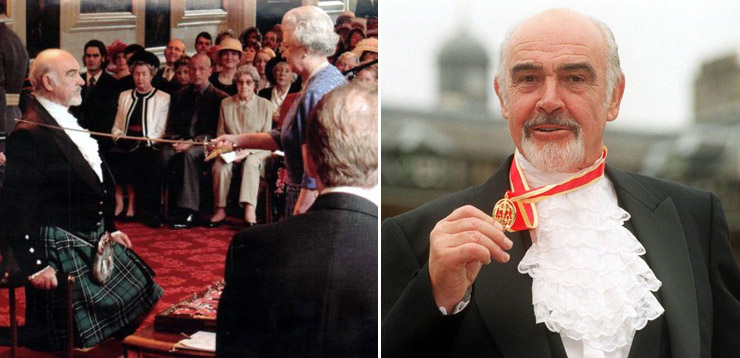 |
|
Sean Connery was knighted
by Queen Elizabeth II at an investiture ceremony at Holyrood Palace in
Edinburgh on July 5, 2000. He had been nominated for a knighthood in 1997
and 1998, but these were reportedly vetoed due to Connery's
political views and support of the Scottish National Party. Sean Connery
then appeared in what would turn out to be his final on-screen performance
in The League of Extraordinary Gentlemen (2003), as fictional hero
Allan Quartermain. The film (which Connery also co-produced) was loosely
based on the first volume of the comic book series of the same name by
Alan Moore and Kevin O'Neill. Connery's fee was reputedly $17-million
which left little money in the budget to attract other named stars for the
ensemble cast. Although The League of Extraordinary Gentlemen was
commercially successful it received almost unanimously bad reviews. Sean
Connery had a very bad time during the making of The League of
Extraordinary Gentlemen, having many disputes with director Stephen
Norrington. It is ironic that his final on-screen performance was in a
film dogged by production problems - a factor present throughout much of
Connery's career. |
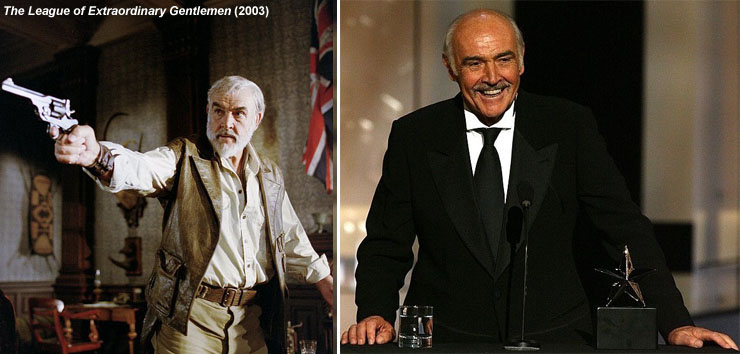 |
|
At the age of 75 Sir Sean
Connery was awarded the American Film Institute's Lifetime Achievement
Award on June 8, 2006. The award is the highest that the AFI can bestow
and Sir Sean was the 34th recipient. At a star-studded ceremony Connery
was presented with the award by Harrison Ford who played his son in Indiana
Jones And the Last Crusade (1989). In 2001 Sean Connery turned
down the role of Gandalf in Peter Jackson's Lord of the Rings
trilogy claiming not to understand the script. Had he accepted the offer,
which included up to 15% of the box-office receipts, he would have made
over $400-million. He announced his retirement from filmmaking in 2007
citing his disillusionment with the “idiots now making films in
Hollywood”. |
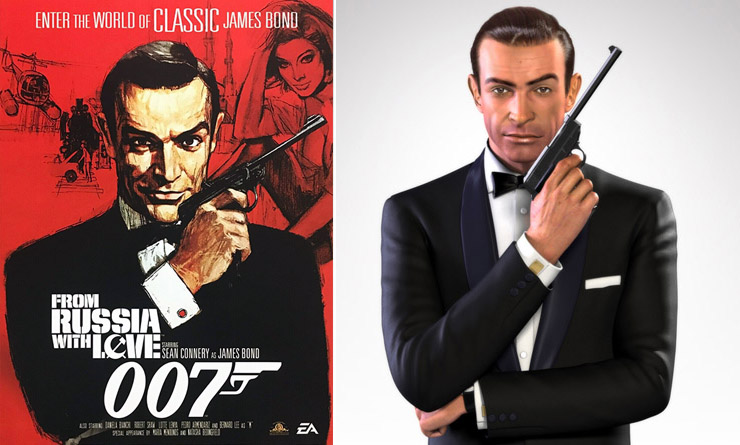 |
|
Since 1967 Sean Connery
had been trying to shake off the mantle of James Bond 007, only to have it
become the one thing that he could profitably return to in
1971, and 1983 when he said ‘Never Again’. It was therefore a huge coup
for EA Games, when in 2005 they announced that Sean Connery had agreed to
provide the voice and likeness for James Bond in the upcoming videogame
based on From Russia With Love. Following in the footsteps of
Pierce Brosnan, who had provided his voice and likeness for the 2003
videogame ‘Everything or Nothing’, Connery played James Bond one final
time with a face based on his 1963 incarnation, but with the voice of a 75
year-old. It is ironic that Connery, who tried so long to escape his
typecasting, was now back in the role that made him a superstar over 40
years ago. The game also featured the likenesses of Bernard Lee, Desmond
Llewelyn, Robert Shaw, Lotte Lenya and Daniela Bianchi. ‘From Russia
With Love’ was
loosely based on Ian Fleming's 1957 source novel and the 1963 film,
although also incorporated the Aston Martin DB5 from Goldfinger
(1964) and Jet-pack from Thunderball (1965). Sean Connery's final appearance
as James Bond would have been a fitting coda to a long and varied career,
but there was still one more project to which he attached his voice and
likeness. Sir Billi (also known as Guardian of the Highlands)
was a computer animated film which was in production for several years,
starting life as a 30-minute short version completed in 2006, but later
expanded to 80-minutes and released in 2012. Unfortunately the resulting
film was poorly received and described by one critic as an “ignominious”
end to Connery's career. |
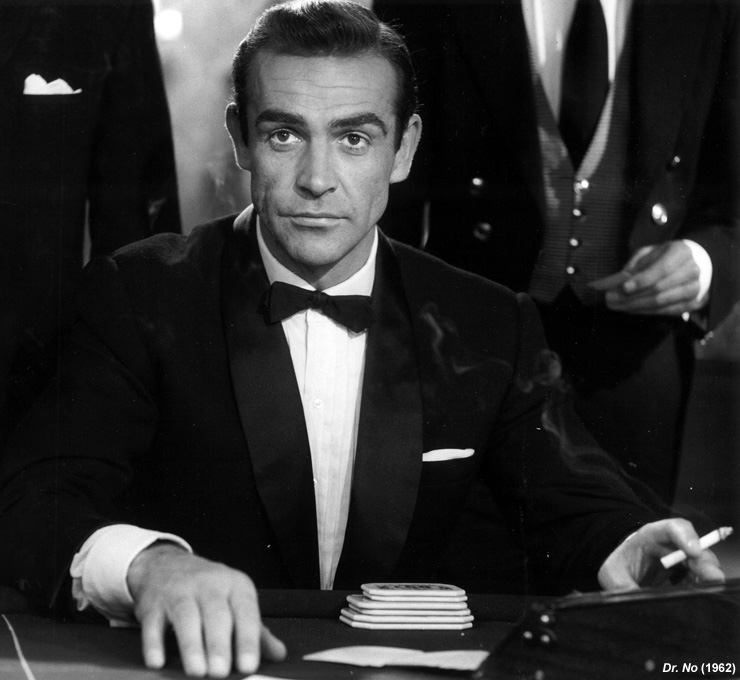 |
|
Sir Sean Connery's legacy
is one of stubborn individuality, whether it be in his choice of film roles,
political views, or his outspoken comments on the selfishness of the James
Bond producers who made him a star. Although he ultimately made up with
‘Cubby’ Broccoli (1909-1996) when he learned the producer was dying, it
was his portrayal of James Bond that is the one thing he will always be
remembered for, despite spending much of his life trying to escape from
any association with the character. At a time when the American studio
system was coming to an end, Sean Connery remained one of the world's
biggest (and most bankable) film stars for five decades, in a career that included
collaborations with the industry's most acclaimed directors and talent, in
front of and behind the camera. Rest in Peace Sir Sean, and thank you for
the memories. |